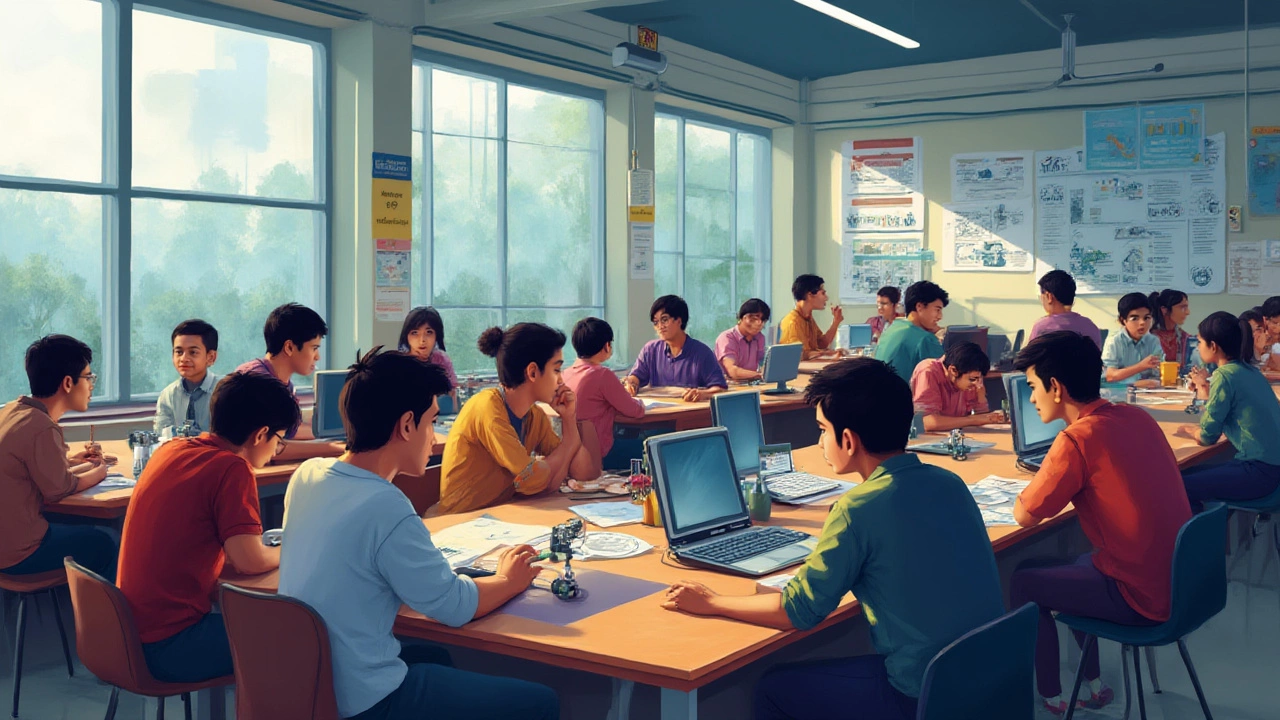
Ask ten students acing the IIT JEE which branch is best, and you’ll probably get ten wildly different answers. Some will swear by Computer Science, others will argue for Electrical, and there’s always that one mechanical geek who dreams in gears and engines. But here’s a twist—what if the real answer isn’t as obvious as everyone makes it out to be? With lakhs of students obsessed over rankings, packages, and who gets to say “I’m in CSE,” wouldn’t it be nice to cut through the noise and figure out what 'best' really means for you?
What 'Best' Means in IIT JEE Branches Today
Before anyone tells you which branch rules the roost, let’s clear the air. The term ‘best branch’ can mean wildly different things for different people. Do you want the highest salary, the coolest research labs, the most startup exposure, or the chillest workload? Understanding your own goals beats chasing what everyone else is running after.
Computer Science Engineering (CSE) still tops the popularity charts—thanks to flashy placement stats and the glam of tech giants like Google and Microsoft hiring right from campus. But it’s not just CSE in the spotlight. Data Science, Artificial Intelligence, and Electrical Engineering also boast rising numbers thanks to tech’s growing reach in our everyday lives. But just because everyone’s fighting for a CSE seat, should you too?
Let’s back it up with some hard truth. Not every campus, not every branch, and not every student walks the same path. For example, a 2023 survey of IIT Bombay grads showed that 42% of Mechanical Engineering students ended up working in IT or analytics roles by their third year after graduating—so much for sticking to the core, right?
Another thing no one tells you: placements and packages look sexy on social media, but they don’t tell the real story. High paying jobs often come with long hours, relentless deadlines, and constant skill upgrades. In other words, you get what you sign up for, so you’d better actually like the field.
To get a clear picture, let’s set the hype aside and look at the mainstream IIT JEE branches, what they genuinely offer, and where they really lead.
Spotlight on Popular Engineering Branches
Different IITs have their own strengths, but most offer these big-league branches: Computer Science, Electrical, Mechanical, Civil, Chemical, and newer options like Data Science or Aerospace. Each stream is a world unto itself, with different cultures, workloads, and post-graduation routes.
Computer Science Engineering (CSE) sits at the intersection of demand and money. Everyone knows friends (or YouTube influencers) flexing about 1-crore+ offers. But here’s some realness—those mega-packages belong to a tiny fraction. The bulk of placements fall in the range of 20-35 lakhs per annum at top IITs, which is still impressive. But what CSE really buys you is flexibility: software, analytics, fintech, startups, research, or even product management if you play your cards right. That said, be ready for intense competition; even getting into CSE means being in the JEE rank single or double digits at top IITs these days. Also, if you hate coding, this will be a grind.
Electrical Engineering (EE) used to be the crown jewel before the software boom. Now, it appeals to those who love solving mathematical problems, electronics, or even want to explore Machine Learning from a hardware side. EE grads land jobs in core sectors, but plenty still move into software, finance, and analytics. Salaries are strong, though slightly below CSE on average, and internships often focus on research, electronics, or circuit companies. In some IITs, the first-year syllabus overlaps heavily with CSE, so the pressure is equally intense.
Mechanical Engineering (ME) attracts kids who dreamed of building bikes, aeroplanes, or robots. It’s hardcore in math, physics, and thermodynamics, and you’ll get plenty of hands-on lab work. While traditional manufacturing and auto industries have slowed in hiring, ME grads are the swiss army knives of engineering—you’ll see them in consulting, analytics, operations, or IT just as much as you will in core sectors. The packages are usually a notch lower than CSE but steady for strong students. And if you’re research-driven, ME is a great platform for higher studies here or abroad.
Civil and Chemical Engineering have smaller batches, and the core field jobs tend to be stable but pay less than the big three. That said, civil engineers who crack the Indian Engineering Services (IES) exam carve out powerful careers. Chemical engineers, meanwhile, can pivot into research, oil & gas, pharmaceuticals, or even software, depending on electives and internships. And don’t sleep on Environmental or Aerospace Engineering—these are niche, but growing thanks to changing global trends.
Newer Fields: Data Science and AI branches are the latest craze and offer a focused route into booming sectors that literally didn’t exist 15 years ago. You’ll work on machine learning, neural networks, and statistical analysis right from day one. The jobs market is hot right now, especially in multinational and tech-heavy firms, but remember, the rush to these courses means competition and workload are both wild. Skills matter more than just your degree at the end of the day.
Let’s see how all this stacks up in cold numbers. Here’s what placement data for the 2024 batch at IIT Bombay looked like:
| Branch | Top Package (LPA) | Median Package (LPA) | No. of Offers |
|---|---|---|---|
| Computer Science | 2.3 Cr | 38 | 85 |
| Electrical | 1.1 Cr | 30 | 74 |
| Mechanical | 55 | 19 | 62 |
| Chemical | 43 | 14 | 51 |
| Civil | 38 | 11 | 47 |
| Data Science/AI | 80 | 29 | 34 |
Behind these big packages is a wild reality: 90% of grads take jobs in India, while a lucky few land international roles (ex: Japan, Singapore, USA). Plenty take up research, higher studies, or launch startups. You don’t see that on most social media highlight reels.

How Admission Ranks Shape Your Choices
Your JEE Advanced rank pretty much controls your options. Each year, seats fill up in a pattern that’s nearly as predictable as the monsoon—CSE at IIT Bombay and IIT Delhi close first, then Electrical, followed by Mechanical, and so on down the list. Cutoff ranks swing wildly between top and newer IITs. For example, the 2024 General category closing rank for CSE at IIT Bombay was around 65. At IIT Patna, the cutoff was about 3300. So, the same branch, but a whole world apart in campus life, peer group, and recruiters.
If you just missed your preferred branch at a top IIT, you’ll have to weigh whether to take a less popular stream at an older campus or grab your dream field at a newer one. This ‘branch vs. college’ debate is real. A quick stat: 70% of IITians surveyed in 2022 said they would pick a top branch at a second-tier IIT over a lower branch at an older IIT if given another chance—mainly because branch abilities matter way more for job roles and internships.
But don’t just follow trends blindly. Your own interests, stamina for slog, and adaptability will shape how much you thrive no matter where you land.
- If you love CS, only CSE or allied branches (like Data Science) will satisfy you—don’t compromise hoping to 'branch change' later, because that's a gamble. At top IITs, only a handful manage to change branches after first year, and the cutthroat competition is brutal.
- If you’re confused, check out alumni stories from different branches on LinkedIn or Quora. Most are happy to chat and share details—they’ve done what you’re aiming for.
- Talk to seniors. Not the 'my friend said…' rumors, but real people a year or two ahead of you. Find out about professors, lab facilities, the workload: it varies more than you’d expect.
- If you like physics, tinkering, and seeing how things work, Mechanical or Electrical could fit. If you want to be outdoors, Civil’s for you. Analytical problem-solvers who also like chemistry? Chemical is legit. Don’t pick anything just because everyone else is doing it.
Future Trends and Industry Demands
The tech landscape is mutating faster than your favorite streaming platform’s interface. A decade ago, traditional engineering branches like Mechanical, Civil, and Chemical had clear, linear paths—a campus placement led to a job in core fields. Now, the job market, both in India and abroad, cares more about adaptability and interdisciplinary skills. You can start in one branch and still weaponize online courses or internships to break into another sector—think Mechanical grads working in robotics startups or Civil engineers pivoting to urban planning with a dash of coding on the side.
Here’s a clue to what’s coming up: NASSCOM, India's tech industry body, projected a 22% year-on-year demand increase for Data Science, AI, and Machine Learning professionals up to 2030. Even oil and core sectors are going digital, which means knowing how to code or work with data gives you a job-market cheat code no matter what your branch.
Another trend: startups are shaking up recruitments. More young companies, even outside the IIT placement grid, are fishing for students with niche skills—think blockchain, AI, sustainability tech, or smart infrastructure. Students who build robust profiles through internships and hackathons often outpace those who follow only the traditional placement path. So, a Mechanical student who spent two years building an electric vehicle project may have a cleaner shot at a cool mobility startup than a CSE topper with zero outside experience.
Academia and research aren’t out of the picture either. If you dream of innovating or teaching, every branch at IIT offers cutting-edge opportunities, especially for students willing to slog a bit for good labs and publish papers. International scholarships and exchange programs are easier for strong academics—so don’t dismiss your love for pure science or research thinking it’s ‘lesser’ than placements.
Here’s something else students often don’t notice: Many disciplines are blurring. Take Bioengineering, Environmental Engineering, or interdisciplinary courses that blend coding, hardware, and sciences. IITs like Madras, Bombay, and Kharagpur now offer dual degrees and minors, letting a Chemical major dabble in Computer Science or an Electrical grad specialize in Quantum Computing. Recruiters like diverse portfolios—your degree is just a launchpad.
Pro tip: Employers care about what you can do, not just where you studied. The branch gives you the basics, but what you build with it counts more. Avg. package tables are nice but compare internship rates, the diversity of recruiters, and how students crack jobs off-campus too; sometimes those matter more than raw highest salaries.
Here’s a practical list for using your time at IIT to the fullest, no matter your branch:
- Start internships early. Even a first-year research assistant gig is gold for later options.
- Build projects outside the syllabus—hackathons, apps, prototypes, anything. Recruiters love seeing initiative.
- Take electives from different departments. The freedom at IIT means a Mechie can ace ML if they hustle.
- Cultivate relationships with professors. They open doors to research, startups, and off-campus gigs.
- Care less about what Instagram or family friends think is cool. Explore, fail, repeat. The best branch is the one where you thrive, not just survive.
At the end of it all, no branch guarantees success—nobody’s future is set at age 18. But pick what excites you, and you’ll have enough fuel to tackle the ride ahead, however bumpy or smooth it gets.






